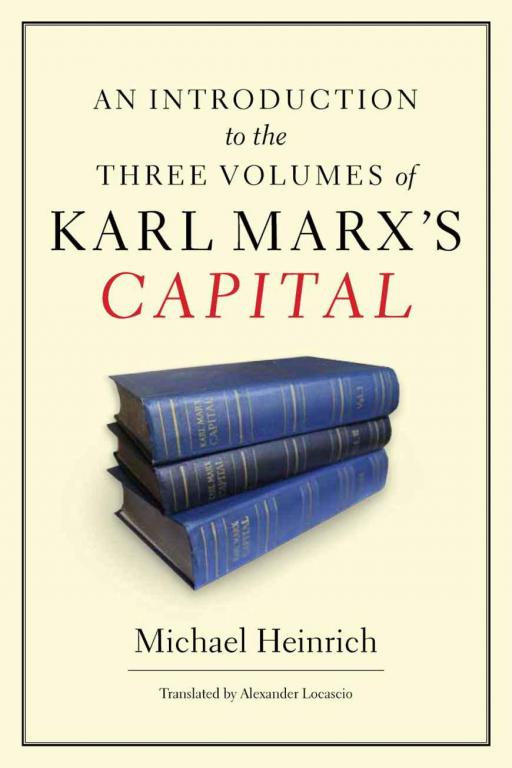An Introduction to the Three Volumes of Karl Marx’s Capital
$13.56 – $79.00

CHOICE Outstanding Academic Title
The global economic crisis and recession that began in 2008 had at least one unexpected outcome: a surge in sales of Karl Marx’s Capital. Although mainstream economists and commentators once dismissed Marx’s work as outmoded and flawed, some are begrudgingly acknowledging an analysis that sees capitalism as inherently unstable. And of course, there are those, like Michael Heinrich, who have seen the value of Marx all along, and are in a unique position to explain the intricacies of Marx’s thought.
Heinrich’s modern interpretation of Capital is now available to English-speaking readers for the first time. It has gone through nine editions in Germany, is the standard work for Marxist study groups, and is used widely in German universities. The author systematically covers all three volumes of Capital and explains all the basic aspects of Marx’s critique of capitalism in a way that is clear and concise. He provides background information on the intellectual and political milieu in which Marx worked, and looks at crucial issues beyond the scope of Capital, such as class struggle, the relationship between capital and the state, accusations of historical determinism, and Marx’s understanding of communism. Uniquely, Heinrich emphasizes the monetary character of Marx’s work, in addition to the traditional emphasis on the labor theory of value, thus highlighting the relevance of Capital to the age of financial explosions and implosions.
I hear from many people who’d love to read Capital, but find the thing almost prohibitively daunting. Michael Heinrich has written an excellent little introduction to Marx’s masterpiece. Among its many virtues is that it takes money and finance seriously, which many Marxists don’t. But even if you’ve read lots of Marx, you can still learn a lot by reading this book.
—Doug Henwood, editor, Left Business Observer
Whether one is a ‘traditional world-view Marxist’ like myself, or a student who wants to understand this world we live in, or an activist who is committed to changing it, Michael Heinrich’s succinct, lucid, compelling summary of the three volumes of Marx’s Capital is a ‘must-read’ in our time of crisis.
—Paul LeBlanc, professor of history, La Roche College; author, From Marx to Gramsci and Marx, Lenin and the Revolutionary Experience
The best introduction to Capital I have read. Heinrich has done the world of Marx scholarship a great service. In presenting Marx’s critique of the entire structure of capitalism, Heinrich manages to be comprehensive, deep, and clear at the same time. While making a substantial advance in analyzing Marx, he makes this book accessible to readers who are relatively unfamiliar with Marx.
—Michael Perelman, professor of economics, California State University, Chico; author, The Invisible Handcuffs of Capitalism and The Confiscation of American Prosperity
A brilliant presentation of Marx’s Capital—it would be hard to imagine a more timely publication. Anyone who thought Marx was irrelevant to today’s movement needs only to read this book to see things differently. Whether people describe themselves as anarchists or socialists, all of us can benefit from understanding what Marx actually wrote. Must reading for everyone in the Occupy movement and for everyone who wants to understand social relations in contemporary capitalist societies.
—Paddy Quick, member, Union for Radical Political Economics;
St. Francis College
This is likely the best short introduction to Marx’s Capital to ever appear in English. Michael Heinrich succeeds in providing the readers with a clear and profound understanding of the core of the Marxian critique of political economy, thanks to his deep knowledge of the critical edition of Marx and Engels’s collected writings and of the German debate.
—Riccardo Bellofiore, professor of monetary economics and history of economic thought, University of Bergamo, Italy; co-editor, Re-Reading Marx: New Perspectives after the Critical Edition
A fundamental reinterpretation and understanding of all major ‘chapters’ of Marx’s theory, many of which which remain until now a matter of different interpretations or even dispute among Marxist and Non-Marxist economists and, more generally, social scientists: value theory, money and the credit system, the ‘falling rate of profit,’ economic cycles and crises, and the circuit of social capital … an important book for all those seeking to comprehend the workings of capitalism, but also for the university library and the students’ or scholars’ study of Marx’s theory.
—John Milios, professor of economics, National Technical University of Athens, Greece
The best and most comprehensive introduction to Marx’s Capital there is. It is written in a most accessible style and provides an admirably clear explanation of complex ideas. In contrast to other Introductions to Marx’s Capital, it offers a sophisticated commentary on all three volumes of Capital, provides an excellent critical commentary on the secondary literature, and includes pertinent case studies to illustrate the contemporary relevance of Capital, including an excursus on anti-Semitism, globalization, and imperialism. Its scholarly treatment of Capital is at once accessible, comprehensive and contemporary. I do not know of any better introduction to Capital for undergraduate students and non-specialist readers.
—Werner Bonefeld, Department of Politics, University of York
In only 220 pages the author achieves a summary of the three volumes of Capital: explaining the connection between labor, commodities, and money, how surplus value arises, what capital is, the role of banks and stock exchanges, and from where crises arise. Alongside this he manages to fit in the history of Marxism, demystify the ambiguous term dialectic, and throw in a final chapter on the role of the state in capitalism, all the while refuting common mistakes about the Marxian corpus.
—Stephan Kaufmann, Berliner Zeitung
Michael Heinrich teaches economics in Berlin and is managing editor of PROKLA: Journal for Critical Social Science. He is the author of The Science of Value: Marx’s Critique of Political Economy between Scientific Revolution and Classical Tradition, and editor, with Werner Bonefeld, of Capital and Critique: After the “New Reading” of Marx. Translator Alexander Locascio was previously active in the U.S. labor movement and now lives in Berlin.
Publication Date: June 2012
Number of Pages: 240
Paperback ISBN: 9781583672884
Cloth ISBN: 9781583672891
eBook ISBN: 9781583672914
Related products
-
Monthly Review Volume 2, Number 9 (January 1951) [PDF]
$10.00 Add to cart -
Monthly Review Volume 2, Number 7 (November 1950) [PDF]
$10.00 Add to cart -
Monthly Review Volume 2, Number 6 (October 1950) [PDF]
$10.00 Add to cart -
Monthly Review Volume 1, Number 7 (November 1949) [PDF]
$10.00 Add to cart -
Monthly Review Volume 1, Number 5 (September 1949) [PDF]
$10.00 Add to cart -
Monthly Review Volume 1, Number 4 (August 1949) [PDF]
$10.00 Add to cart

 [PDF].jpg)
 [PDF].jpg)
 [PDF].jpg)
 [PDF].jpg)
 [PDF].jpg)
 [PDF].jpg)